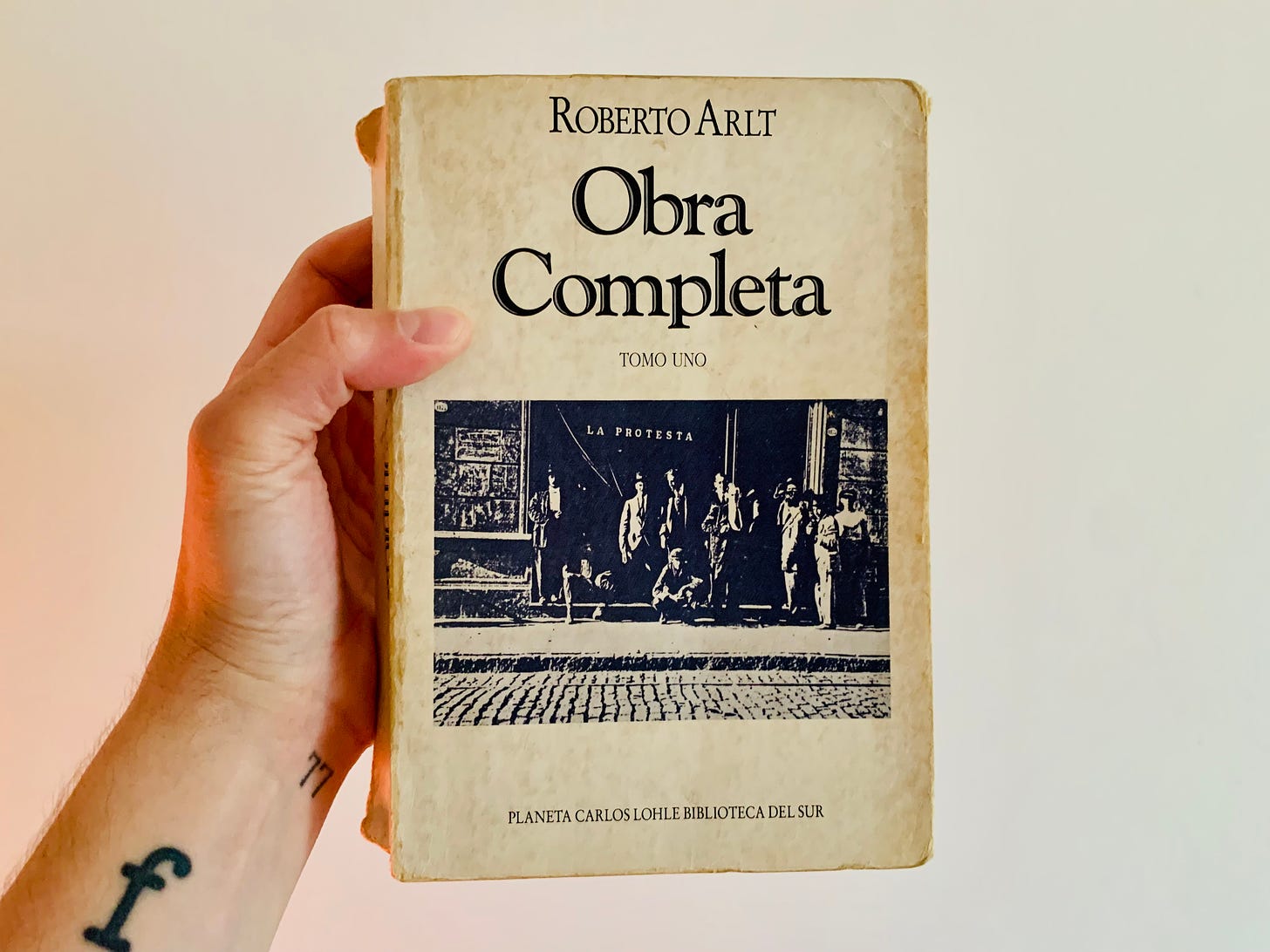Roberto Arlt (1900-1942) was an Argentine writer, journalist, playwright and inventor. Born to immigrant working class parents (Prussian father, Italian mother) he grew up with German as a mother tongue. Arlt is a distinctive literary voice, with a unique and accented prose, and a remarkable sensitivity for tales of the underworld and the plight of the urban wretched — this is a sensitivity he perfected working as a crime reporter.
At the time Arlt was writing, literature in Argentina was the métier of the well-off, as mostly everywhere else. We live in different times now, and if literature once suffered from the disease of aristocracy it now suffers from the disease of professionalism (real or pretend). In either case, Arlt’s words in the prologue to his novel Flamethrowers — here in my own translation — offer hope of a literature sans bullshit, where the written world is born out of an uncontrollable urge to write. And nothing else.
With Flamethrowers ends the novel known as The Seven Madmen.
I am pleased to have found the will, in pretty unfavourable conditions, to give an end to a piece of work that demanded solitude and self-absorption. I worked always in the boisterous newsroom, harassed by the obligation of the daily column.
I say this to encourage beginners in this vocation, those always interested in the technical procedures of the novelist. When you have something to say, you write anywhere. On a paper reel or in an infernal room. God or the Devil are by your side, dictating unspeakable words.
I am proud to say that writing is for me a luxury. I do not have at my disposal, like other writers, a rent, time, or a lethargic civil service job. To earn your life writing is painful and hard. Particularly when at work you stop to think of those who’d suffer burnout from the worries of finding distractions.
Moving on, it is said that I write badly. Maybe. In any case I would not have any difficulty in enumerating many who write well and who are only read by family members.
To pursue a style it is necessary to have comfort, to live off a rent, to have an easy life. But in general those who enjoy these benefits avoid the hassle of literature, or take it as an excellent procedure to stand out in high society salons.
I am ardently attracted to beauty. How many times have I wished to work in a novel that, as those of Flaubert, is composed of panoramic canvases…! But today, amongst the noises of a social fabric that is inevitably crashing to the ground it is not possible to think of embroidery. A style requires time, and if I heard my comrades’ advice I would end up doing what they do: write a book every ten years, to then take a ten year holiday, for having taken ten years in writing one hundred reasonable and discreet pages.
Changing tack, others outrage about the brutality with which I express certain situations perfectly natural in the relationship between the sexes. Later, in these same high society columns they have babbled about James Joyce, rolling their eyes until white. This originates in the spiritual joy a certain character from Ulysses caused them: a gentleman who devours with his nose, more or less aromatically and from a toilet seat, the stench from the excrements he has defecated a minute ago.
But James Joyce is English1. James Joyce has not been translated into Spanish, and it is of good taste to fill one’s mouth talking about him. The day James Joyce is available to everyone, those same society columns will crown a new idol, that will in turn be read only by half a dozen Chosen Ones.
In reality, it is hard to know what to think of people. Whether they truly are idiots, or whether they really take seriously the crass comedy they represent every hour of their days and nights. In any case, as a first measure, I have decided not to send my work to the literary criticism section of any newspaper. What for? So that a stressed gentleman — between the annoyance of two phone calls — writes “Mr Roberto Arlt remains tied to a realism of dire taste, etc, etc,”?
No, no, and no.
Those times have passed. The future is ours, by the prepotency of our hard work. We will create our own literature, not by talking about literature but writing in proud solitude books that encapsulate the violence of a cross to the chin. Yes, book after book, and “may the eunuchs hoof.”
The future is triumphantly ours. We have earned it sweating ink, gnashing our teeth, in front of the Underwood that we hit with tired hands, hour after hour, hour after hour. Sometimes one nodded off with fatigue but… while I write these lines I think of my next novel. It will be called Witch Love and it will be released in August of 1932.
And may the future decide.
Yes, he says “English”. Get over it. There wasn’t Wikipedia then.





powerful and passionate